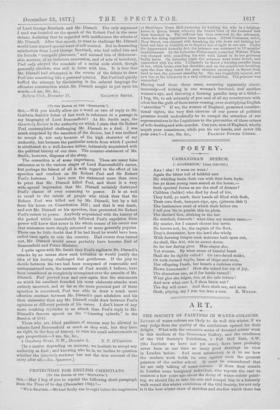[To Tar EDITOR OF THIC "SPROTATOR.1 Sin,—Will you kindly allow
me a word or two of reply to Mr. Goldwin Smith's letter of last week in reference to a passage in my biography of Lord Beaconsfield? As Mr. Smith says, the Quarterly Review is the authority on which I state that Sir Robert Peel contemplated challenging Mr. Disraeli to a duel. I was much surprised by the assertion of the Review, but I was inclined to accept it, not only because of the high character of my authority, but because the particular article from which I quoted is attributed to a well-known writer, intimately acquainted with the political history of our time. The counter-statement of Mr. Smith, however, disposes of the story.
The correction is of some importance. These are many false estimates as to the various stages of Lord Beaconsfield's career, but perhaps the falsest of all is with regard to the effect of his 'speeches and conduct on Sir Robert Peel and Sir Robert Peel's fortunes. I have seen the statement more than once in print that Mr. Disraeli killed Peel, and there is a very wide-spread impression that Mr. Disraeli certainly destroyed reel's chance of ever returning to power. It is as well to recall to the minds of people who think thus that Sir Robert Peel was killed not by Mr. Disraeli, but by a fall from his horse on Constitution Hill ; and that it was death, and not Mr. Disraeli or his speeches, that prevented Sir Robert Peel's return to power. Anybody acquainted with the history of the period which immediately followed Peel's expulsion from Tower will know that never in the whole course of his career was that statesman more deeply esteemed or more generally popular. There can be little doubt that if he had lived he would have been 'called once again to rule the country. Had events thus turned out, Mr. Disraeli would never probably have become Earl of Beaconsfield and Prime Minister.
I quite agree with Mr. Smith that Peel's replies to Mr. Disraeli's attacks by no means show such irritation as would justify the idea of his having challenged that gentleman. If the jury to -decide between the two had been composed of reasonable and unimpassioned men, the answers of Peel would, I believe, have been considered as completely triumphant over the assaults of Mr. Disraeli. Peel proved over and over again that the statements on which his assailant founded his most elaborate attacks were entirely incorrect, and so far as the mere personal part of these speeches is concerned, Peel was able to draw a much more effective contrast between Mr. Disraeli's past adulation and his then animosity than any Mr. Disraeli could draw between Peel's opinions at different periods of his career. I don't know of any more crushing rejoinder to an attack than Peel's reply to Mr. Disraeli's famous speech on the "Canning episode," in the Session of 1846.
Those who are blind partisans of success may be allowed to admire Lord Beaconsfield as much as they wish, but they have no right, in the face of history, to raise his small achievements to epic proportions.—I am, Sir, &c.,
4 Osnaburg Street, .N. W., December 5. T. P. O'CoarNon.
[In a matter depending on memory, we hesitate to accept any authority as final ; and knowing who he is, we incline to question whether the Quarterly reviewer bas not the true account of the story after all.—En. Spectator.]






































 Previous page
Previous page